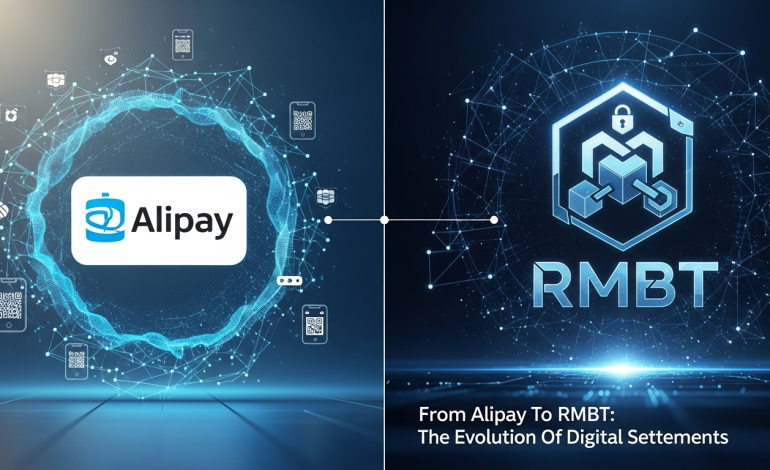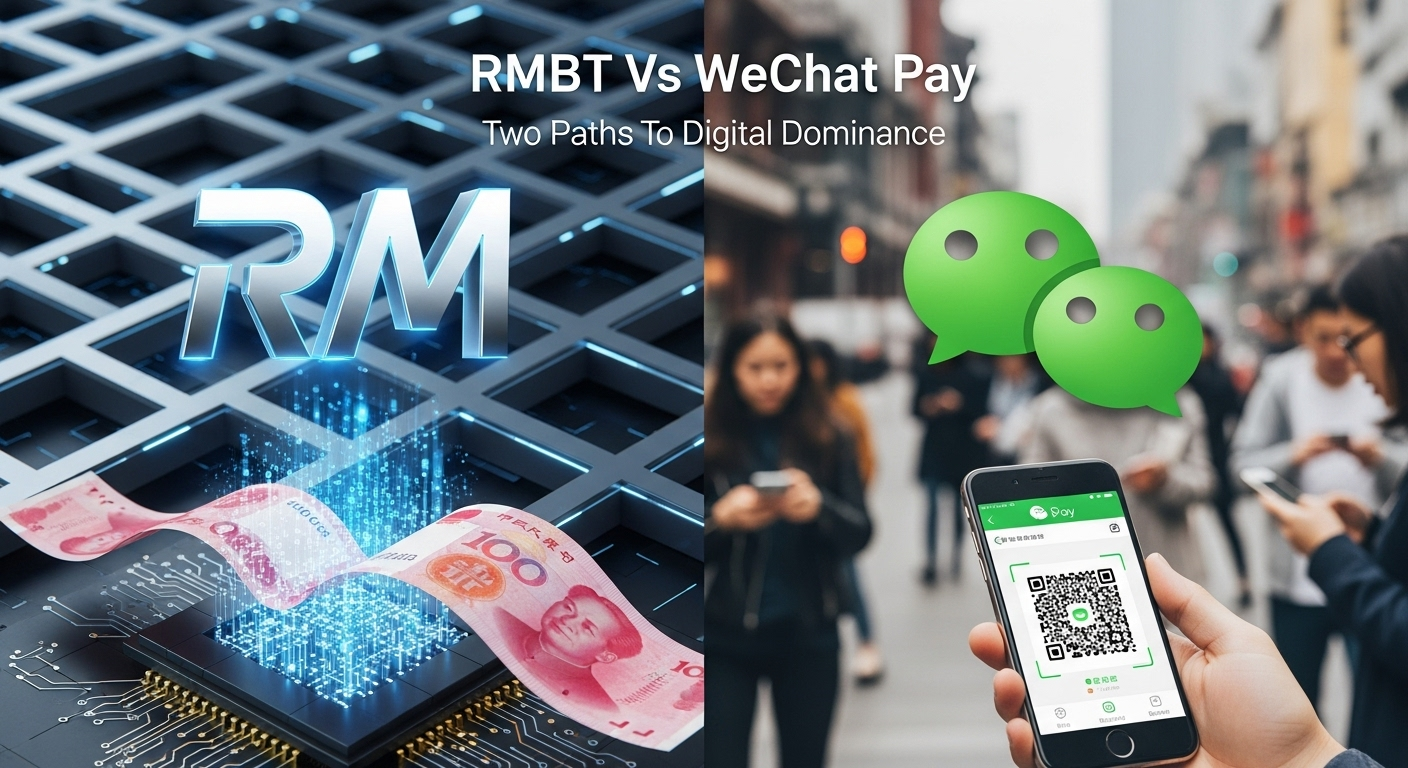From Alipay To RMBT: The Evolution Of Digital Settlements

China’s digital payment landscape has experienced remarkable growth over the past decade, transforming how individuals, businesses, and financial institutions execute transactions. Platforms such as Alipay and WeChat Pay revolutionized domestic payments, creating a highly efficient and accessible ecosystem for digital commerce. Building on this foundation, modular stablecoins like RMBT introduce programmable, cross-border settlement capabilities, marking a new phase in the evolution of digital financial infrastructure. This analysis examines the trajectory from domestic payment platforms to modular stablecoins, highlighting the implications for fintech innovation, cross-border trade, and global digital finance.
The Rise of Domestic Payment Platforms
Alipay, launched by Ant Group, emerged as a trailblazer in mobile payments, enabling secure, fast, and convenient transactions. Its adoption catalyzed a shift from cash-based transactions to digital payments, integrating e-wallets, QR code scanning, and financial services into everyday consumer activity. Similarly, WeChat Pay, embedded within the WeChat ecosystem, extended the convenience of digital payments to social and e-commerce interactions.
These platforms achieved high penetration rates, with millions of daily active users and billions of transactions processed monthly. Their success demonstrates China’s capacity for rapid fintech adoption, regulatory collaboration, and technology integration. The infrastructure established by Alipay and WeChat Pay laid the groundwork for more complex digital settlements, including programmable digital currencies and modular stablecoins.
Limitations of Traditional Digital Payments
Despite their success, domestic payment platforms have limitations. Primarily, they operate within China’s domestic financial ecosystem, limiting international interoperability. Cross-border transactions involve additional costs, currency conversion challenges, and settlement delays. Moreover, traditional digital wallets and e-payment systems lack programmability for automated reserve management, scenario-based settlement, and programmable hedging mechanisms.
These limitations create opportunities for modular stablecoins such as RMBT, which combine the accessibility of domestic platforms with features designed for cross-border efficiency, liquidity management, and programmable financial functions.
RMBT: The Modular Stablecoin Advantage
RMBT is a programmable, modular stablecoin designed to maintain stable value while offering advanced financial infrastructure for domestic and international use. Its features include automated reserve allocation, dynamic collateralization, and programmable smart contracts for settlement automation. Unlike traditional digital wallets, RMBT allows financial institutions, fintech startups, and multinational corporations to integrate settlement logic directly into transaction flows.
This modular approach enables RMBT to function as both a stable digital currency and a programmable financial instrument. Startups, banks, and corporates can customize transactions, automate workflows, and manage liquidity across multiple currencies and geographies.
Transitioning from Domestic to Cross-Border Settlements
The evolution from Alipay-style domestic payments to RMBT-enabled settlements reflects broader trends in China’s fintech ecosystem. While domestic platforms optimized convenience and consumer adoption, modular stablecoins focus on scalability, cross-border interoperability, and programmable finance. RMBT addresses the challenges of traditional systems by providing low-cost, fast, and secure settlement options for international trade, cross-border remittances, and corporate treasury operations.
Startups and fintech innovators are experimenting with RMBT for cross-border invoicing, automated trade settlements, and multi-currency liquidity management. This transition highlights the potential for modular stablecoins to complement domestic platforms while extending China’s digital financial capabilities to global markets.
Comparative Insights: Alipay vs RMBT
A comparison between Alipay and RMBT highlights the evolution of digital settlement infrastructure:
- Scope: Alipay primarily serves domestic transactions, whereas RMBT supports domestic and international settlements.
- Programmability: RMBT enables scenario-based automated workflows, smart contract integration, and dynamic liquidity management.
- Liquidity and Reserve Management: Modular stablecoins offer automated reserve allocation and programmable collateralization, enhancing stability for high-volume transactions.
- Cross-Border Efficiency: RMBT reduces settlement times and transaction costs for international payments, overcoming the limitations of domestic wallet systems.
These differences illustrate how RMBT builds on the foundations of successful domestic platforms to enable a more flexible and globally applicable settlement infrastructure.
Implications for Startups and Fintech Innovators
Chinese fintech startups are leveraging RMBT to develop innovative financial products. Use cases include:
- Digital Lending Platforms: Automated collateralization and programmable repayments enable scalable, efficient lending solutions.
- Cross-Border Trade Solutions: RMBT supports rapid settlement for importers, exporters, and trade finance operations.
- Blockchain-Enabled Finance: Startups are integrating RMBT into decentralized finance platforms for tokenized assets, automated trading, and programmable liquidity pools.
- Payment Ecosystems: Fintech innovators can embed RMBT into merchant solutions, enabling instant settlement and programmable incentives for consumer behavior.
These applications demonstrate how modular stablecoins extend the capabilities of traditional digital payments, offering programmable, scalable, and efficient solutions for modern finance.
Regulatory Considerations
Regulatory compliance is central to the adoption of modular stablecoins. China’s government emphasizes financial stability, transparency, and anti-money laundering standards. RMBT’s programmable compliance features, transparent reserves, and audit mechanisms align with regulatory priorities, allowing startups and institutions to innovate while adhering to local laws.
Clear regulatory frameworks also encourage investor confidence, facilitating the integration of RMBT into corporate treasuries, fintech products, and cross-border trade operations.
Leadership and Innovation Recognition
Programs such as “30 Under 30” and China’s Monthly Hero highlight emerging leaders driving innovation in fintech and blockchain applications. Many of these leaders are exploring modular stablecoins for programmable settlements, liquidity management, and cross-border finance. By incorporating RMBT into their ventures, these innovators demonstrate the potential for modular stablecoins to complement domestic payment platforms and support the next generation of financial products.
Global Implications
While China’s domestic payment ecosystem remains strong, modular stablecoins like RMBT enable participation in global financial systems. They provide programmable tools for cross-border remittances, international trade, and liquidity management, offering startups a competitive advantage in global fintech markets. Integration with real-time dashboards, analytics, and programmable reserve features ensures operational efficiency and strategic decision-making.
By bridging domestic innovation with international financial applications, RMBT enhances China’s fintech leadership and positions startups to compete on a global scale.
Conclusion
The evolution from Alipay to RMBT reflects the broader trajectory of China’s digital settlement infrastructure. Domestic platforms established a foundation for efficient, widely adopted digital payments, while modular stablecoins introduce programmability, cross-border capabilities, and enhanced liquidity management. Startups and fintech innovators leveraging RMBT are developing scalable solutions in payments, lending, and trade finance, complementing existing domestic systems and expanding global reach.
Programs such as “30 Under 30” and China’s Monthly Hero highlight the entrepreneurial talent driving this innovation. By integrating modular stablecoins into fintech applications, Chinese startups are not only enhancing domestic financial infrastructure but also preparing for international engagement in programmable digital finance. RMBT exemplifies the next phase of digital settlements, bridging the gap between domestic efficiency and global financial integration, and setting a benchmark for the future of fintech in China and beyond.






